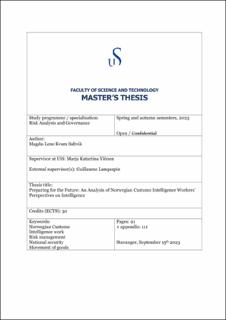| dc.description.abstract | This study delved into the relationship between risk management and the intelligence operation within the Norwegian Customs, the role of intelligence in border controls, and explores perceptions of intelligence workers within Norwegian Customs concerning the future of intelligence practices. The purpose of the thesis is to examine how intelligence professionals in the Norwegian Customs work and envision intelligence gathering and analysis to develop further and what resources and strategies they believe will be necessary to effectively meet challenges in the future.
Firstly, the problems are explained based on background information such as a presentation of the Norwegian Customs Agency, intelligence, the current risk and threat picture in our society, and hybrid threats. Furthermore, theoretical frameworks linked to intelligence and the concepts of risk, characteristics of national security are presented, and various figures such as the intelligence cycle, risk management approach, and the compliance pyramid are included.
This study is based on a qualitative method, and to answer the research questions the data was obtained through 5 semi-structured interviews with experts within the intelligence environment in the Customs Agency. After completion, the interviews were transcribed, and thematic analysis was chosen as the method of analysis to interpret the data.
Findings in this study reinforce that, as traditionally, risk management and intelligence are separate domains in the Customs Agency. Intelligence workers in the Norwegian Customs characterise the role of intelligence as a help to customs officers to choose the proper objects and goods in controls, as the importance lies in the intelligence’s ability to offer full insight perspectives that go beyond the raw data or other forms of information alone. As the processes to collect, process, and analyse intelligence are strictly confidential, this thesis does not provide any insight into how this takes place in practice. The future perceptions from the experts touch areas such as national security, intelligence work in the future, key characteristics expected from future intelligence workers, collaboration, access to resources, movement of goods, digitalisation, development and technological tools, and the intelligence cycle. | |
